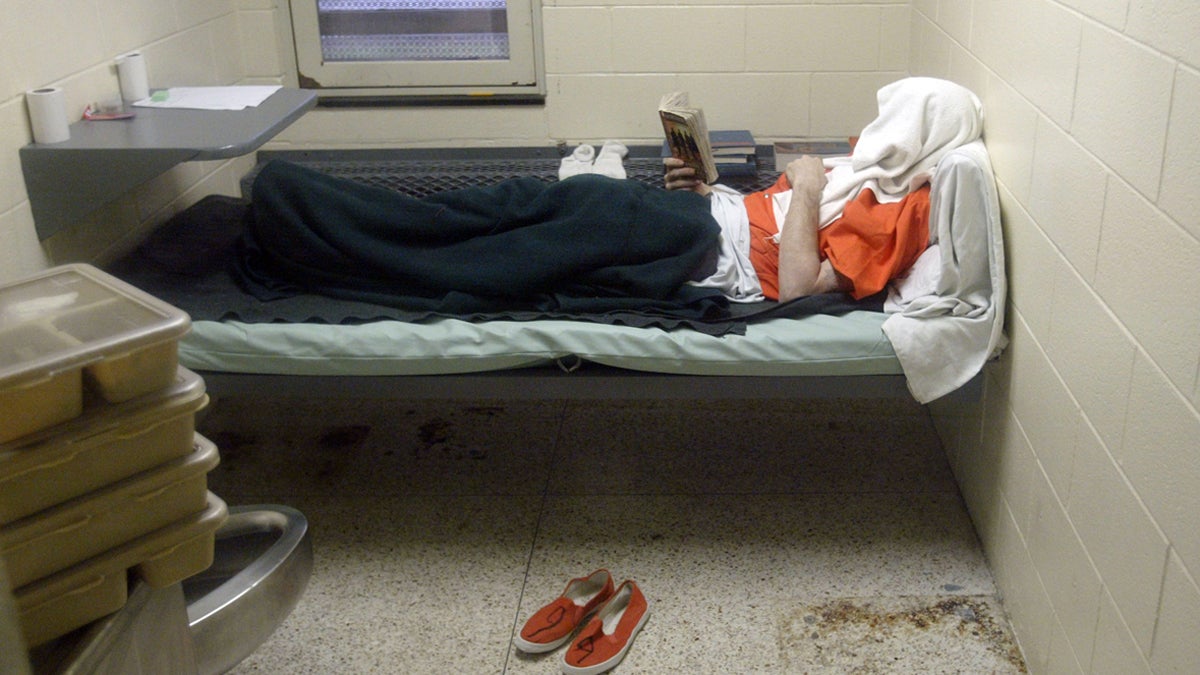Federal report condemns use of solitary confinement for mentally ill prisoners in Pa.

In this 2010 photo, an inmate who was transferred from the Pennsylvania Department of Corrections lies in his cell in a segregated area alone as punishment (Ken Stevens/AP Photo/The Muskegon Chronicle)
For prisoners with mental illness and intellectual disabilities, solitary confinement can lead to severe mental and physical harm and the U.S. Deparment of Justice says Pennsylvania prisons need to use it more sparingly.
In releasing findings of a 2013 investigation into solitary confinement of prisoners with mental illness across Pennsylvania, the Justice Department declared them unconstitutional under the 8th Amendment and in violation of the Americans with Disabilities Act.
Isolation itself is punishment, and it can lead to further neglect and abuse. Other issues cited by Justice include excessive use of full-body restraints, unsanitary conditions, and harassment by correctional facilities’ staff.
At the same time, the federal investigation acknowledged that it saw improvements over the period of study, and that many of the civil rights violations stemmed from “systemic deficiencies” which “interfere with [the prison system’s] ability to provide adequate mental health treatment.”
The back story
This was not the first investigation into solitary confinement of prisoners with mental illness in Pennsylvania.
The state correctional institution located in Cresson, Pennsylvania, was the subject of an 18-month investigation by the Department of Justice starting in 2011. Uncovering civil rights and constitutional violations at Cresson, the Department of Justice launched an investigation of all 28 state controlled prisons. Cresson closed shortly before those findings were published in May 2013.
Independent advocacy groups have also been following this issue. The Disability Rights Network, which did its own seven year investigation into civil rights violations and the restricted housing for prisoners with mental illness, brought a lawsuit against the Pennsylvania Department of Corrections in 2013. Investigating a dozen jails and interviewing hundreds of prisoners, the DRN is currently in settlement negotiations with the corrections department.
Although unable to take a specific position on the report, DRN attorney Robert W. Meeks said, “We’re grateful that the Department of Justice is taking it seriously and has gone through the trouble of issuing its findings letter.”
Improvements
Although hundreds of prisoners with mental illness remain in solitary confinement, sometimes for extended periods of time, prison leaders are improving mental health treatment and disciplinary policy to more humanely treat their mentally ill populations.
The first step is training all 16,000 corrections staff in basic mental health triage. Said corrections secretary John Wetzel, “We’re doing this training called mental health first aid training, which is a nationally recognized 8-hour training that’s really akin to first aid training.”
Other system-wide improvements in the works include crisis intervention training for staff, increasing licensed mental health staff in the prison system, and training more prisoners as forensic peer specialists.
Mental health services outsourced to MHM, with a performance measures tied to winning the bid. “The outcome we want is keeping mentally ill individuals in our system healthy and in the general population,” said Wetzel.
The conditions of solitary confinement have also been updated for people with serious mental illness. Instead of one hour of free time per day, these inmates get 20 hours of activities and free time outside of solitary confinement.
More than 20 percent of prisoners in Pennsylvania are diagnosed with a mental illness or intellectual disability. Between 7 and 10 percent are considered to have severe mental illness.
WHYY is your source for fact-based, in-depth journalism and information. As a nonprofit organization, we rely on financial support from readers like you. Please give today.

